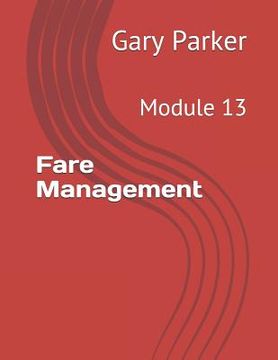Compartir
Fare Management: Module 13 (en Inglés)
Gary Parker
(Autor)
·
Independently Published
· Tapa Blanda
Fare Management: Module 13 (en Inglés) - Parker, Gary
$ 29.310
$ 40.710
Ahorras: $ 11.400
Elige la lista en la que quieres agregar tu producto o crea una nueva lista
✓ Producto agregado correctamente a la lista de deseos.
Ir a Mis Listas
Origen: Estados Unidos
(Costos de importación incluídos en el precio)
Se enviará desde nuestra bodega entre el
Martes 23 de Julio y el
Martes 30 de Julio.
Lo recibirás en cualquier lugar de Chile entre 1 y 3 días hábiles luego del envío.
Reseña del libro "Fare Management: Module 13 (en Inglés)"
The primary fare management objective of airlines that has perpetuated since deregulation is to match a competitor's fare. This is based on the premise that in a capital-and asset-intensive industry, the marginal cost of adding passenger is very low and hence the focus is to protect and retain market share and pay down fixed costs. Consequently, an airline's fare actions are mostly reactive. Fare changes could be classified into two groups, regional or system-wide fare changes and market-specific changes. The former consists mainly of sales and general increases on all fares. Sales are always matched except when an existing sale provides a better incentive to the public than the new one.Market-specific fare changes are typically triggered by a single carrier based on the carrier's perceived dominance in a market or based on schedule-related service changes in the market. When a fare action is triggered by an airline, other carriers typically respond with an identical response to protect market share regardless of the revenue impacts. Sometimes, the reaction ripples through other markets or differs from the original change, inducing a series of cascading changes. This behaviour of reactive fare response is consistent with the desire of most airline executives to retain and protect market share. Research dating back to the nineteenth century confirms that price matching in the competitive marketplace can be an optimal strategy.In this module, we begin by looking at latency in the price planning and execution process. We describe fare dimensions, fare types, and the classification of fare products along with usage rules and purchase restrictions. The second part introduces the fare management process. The next section is on how fare management impacts revenue management.
- 0% (0)
- 0% (0)
- 0% (0)
- 0% (0)
- 0% (0)
Todos los libros de nuestro catálogo son Originales.
El libro está escrito en Inglés.
La encuadernación de esta edición es Tapa Blanda.
✓ Producto agregado correctamente al carro, Ir a Pagar.

